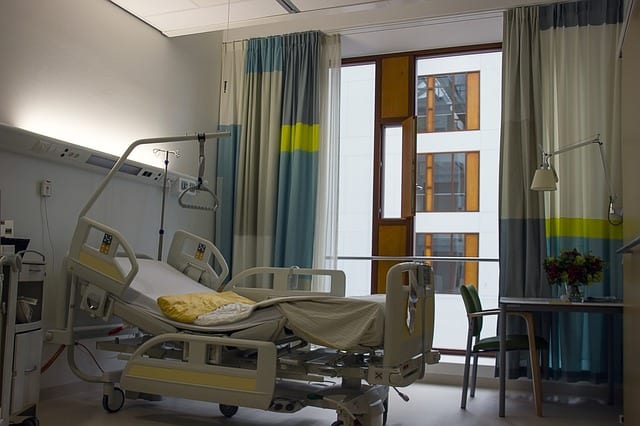
Do you know what it’s like to get medical care in West Virginia?
It’s not easy.
There just aren’t many doctors there. The state is sparsely populated and extremely poor. If you live in West Virginia and need a specialist, you could be waiting months. Psychiatrist are rare as hens’ teeth and obstetricians keep moving their practices out of state. And if you have an emergency, good luck. Hospitals are few and far between. Out in the mountains it takes an hour for an ambulance to reach you and then it’s an hours’ ride back. And when you get there: the waits are long, they’re understaffed, and the treatment is basic. If you need any special care they put you back in the ambulance and drive you to the nearest big city; up in northern WV, that’s Pittsburgh, an hour away and across state lines. And then you get the job of paying that extra-large ambulance bill or two, on top of everything else you owe. No, medicaid doesn’t always cover it, and that’s if you can get medicaid.
Sometimes people line up for hours to go to a traveling free clinic. And that article I just linked to was from Charleston, the capital, the closest to a big city that West Virginia has. In the biggest city in the state, desperate people lined up for hours and hours to go to a travelling free clinic and receive dental, eye and gynecological care that wasn’t covered by their insurance if they had insurance at all. And for those who couldn’t get to the free clinic? The only dental relief some people ever have is extraction. Think about that the next time you make jokes about toothless hillbillies.
Keep all this in mind when I tell you that, according to the Washington Post, disgraced former bishop Michael J. Bransfield moved $21 million in funds away from a hospital and into his own fund.
According to anew investigative report by Robert O’Harrow Jr. and Shawn Boburg, Bransfield and his diocesan accomplices (of which there are a depressingly large number) moved a total of $21 million from Wheeling Hospital into the “Bishop’s Fund,” a nonprofit he’d created saying it was for “helping residents of West Virginia.” A lot of that of that money went to Catholic schools and parishes, buying them altarpieces and such, but church officials also were lavish about transferring it into Bransfield’s personal bank accounts for his own discretionary use.
Wheeling Hospital is a nonprofit institution that relies on government funding from Medicaid and Medicare to stay open, and the bishop found a way to appropriate that money for himself.
That article I linked to about the desperate people lining up for free medical care in Charleston? Charleston is the home of Sacred Heart Co-Cathedral, which received $2,291,931.54 from the “Bishop’s Fund,” sponged away from Wheeling Hospital. But at least that money stayed in West Virginia.
Even though Bransfield told the IRS that that money was only for use in the state of West Virginia, about $300,000 of it went out of state.
Cardinal Kevin Farrell received two checks for over ten thousand dollars each, a gift to spruce up his apartments in the Vatican– he has since returned the money to the diocese.
Bransfield defended that present to the cardinal; he called them “funds that I raised,” which is true. He raised them by creating the Bishop’s Fund in 2014, in order to access funding from Wheeling Hospital, which was finally turning a profit after many years in the red. The Justice Department is investigating to see whether any crimes were committed, which seems awfully likely to me. But whether they were crimes or perfectly legal shady dealings that ought to be made illegal, the fact remains: Bransfield helped himself and the diocese of Wheeling-Charleston to $21 million, taken from a hospital, in West Virginia which ranks 48th in the nation for healthcare.
I’ve written twice so far about my dismay at Bransfield’s abuses and excesses, and here I am sputtering again. There’s so little I can say in the face of such callous disregard for human beings. He lived like a king, chartering jets out of state for luxury shopping sprees so he wouldn’t enrich any local artists. He spent thousands every month on liquor and fresh cut flowers. He emotionally terrorized and allegedly sexually harassed many. And here he’s been caught with his hand in the cookie jar, taking money from a hospital while the people of his diocese suffered.
This man was left at the reins of the diocese of Wheeling-Charleston for thirteen years. Others in the hierarchy took money from him and didn’t ask any questions about where it came from. Everyone in Rome was happy to let things go on as they were for over a decade.
Meanwhile, the people of West Virginia were neglected in abject poverty.
All the squabbling I’ve seen on the Catholic internet this weekend has been about whether a statue was Pachamana or Our Lady of the Amazon; people calling themselves “Cristeros” for rejoicing in that statue’s destruction at absolutely no personal risk; traditionalists claiming the whole Church will be ruined if we do what the Eastern Churches have done from the very beginning and allow some married men to be ordained. And I’m not saying we shouldn’t think about all that. I certainly have been. But in the meanwhile, this investigative report was released, and I don’t see very much outrage from Catholics who aren’t from West Virginia or near it.
Do you want to talk about idolatry? This is it. The shameless glorification of wealth, luxury and influence above all else is idolatry. Forgetting the poor you step over on your quest for wealth, luxury and influence is human sacrifice to that idol. Every Catholic in West Virginia and every person who could have benefited from the diocese’s charity was sacrificed to Bransfield’s insatiable greed for thirteen years.
Listening to the cry of the poor might be a good antidote for this brand of idolatry, but I’m beginning to despair that that will happen.
(image via Pixabay)
Steel Magnificat operates almost entirely on tips. To tip the author, visit our donate page.












